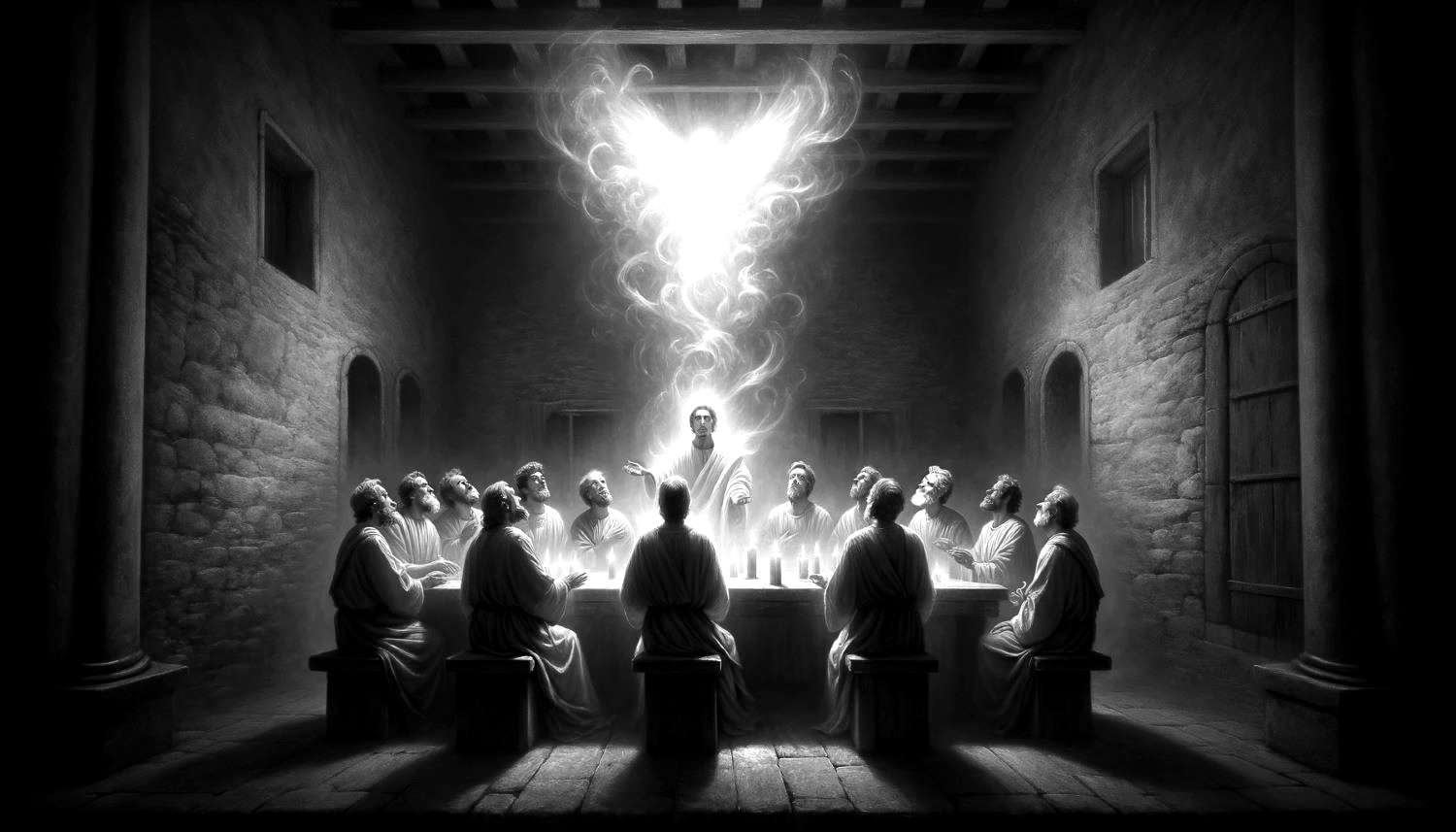

QŌDEŠ RÛAĤ : Holy Spirit in the Old Testament
Pr. Blesson K P
Introduction
The Old Testament serves as a rich repository of history, laws, prophecies, and divine encounters of ancient Israel. Within its pages, the Holy Spirit emerges as a vital and recurring theme, reflecting the sacred and divine nature intertwined with creation, revelation, and human endeavors. The concept of the "Holy Spirit" in the Old Testament is a profound and multifaceted theme that intertwines the sacred and the divine. It is rooted in the Hebrew terms- "holy" (qōdeš) and "spirit" (rûaħ ). Its association with Yahweh and God deepens its significance, portraying the spirit as a divine force intertwined with creation, inspiration, community, leadership, and human endeavors. Understanding the biblical concept of "spirit" necessitates a broader perspective than solely relying on the term "holy spirit" alone. This article provides a comprehensive examination of the Holy Spirit's role in the Old Testament, drawing from biblical texts, theological insights, and historical perspectives to illuminate its significance for believers today.
The Concept of the Holy Spirit in the Old Testament
The term "Holy Spirit" finds its roots in Hebrew terms, reflecting divine attributes and roles intertwined with creation, inspiration, community, and leadership. This section examines the fundamental meanings of the term "spirit" in Hebrew texts and its association with Yahweh, portraying the Spirit as a divine force active in the world. The term rûaħ appears 378 times in Hebrew texts and 11 times in Aramaic passages. Its fundamental meanings include "wind," "moving air," and "breath." The term possibly reflects the wind's power to move objects. In the OT, rûaħ's meanings converge when associated with Yahweh as his 'spirit' (23 times) or as the 'spirit of God' (16 times), or with a possessive pronoun referring to the deity. This notion emerges in texts, such as Isaiah 63:10,11 and Psalm 51:13. While these passages suggest the anticipation of the spirit's bestowal, the broader understanding of the "spirit" in the Old Testament transcends the mere terminology of "holy spirit" alone.
Functions of the Spirit
"Rûaħ" - the Spirit of Creation and Providence
The Spirit is portrayed as an almost impersonal force of God's awe-inspiring power in creation (e.g., Gen. 1:2; Ps. 33:6; Ezek. 37:1-10). In the opening verses of Genesis, the Spirit of God hovers over the waters, participating in the act of creation itself. The Hebrew word used for "Spirit" here is "rûaħ" denoting breath, wind, or spirit. The Spirit's presence signifies divine activity, bringing order out of chaos and sustaining the created order.
Spirit - A sign of Covenantal relationship
The Spirit's presence is intimately linked to the covenant relationship between God and His people, as seen in passages like Ezekiel 11:14-21 and 36:22-32. Within the Old Testament narrative, the Spirit's presence is poured out upon individuals and the community as a sign of God's faithfulness and commitment to His promises. In the book of Ezekiel, the prophet envisions a future restoration in which God will cleanse His people from impurity and give them a new heart and a new spirit.
Spirit of Leadership: Consecration and Impartation
The Spirit's role in endowing Israel's leadership with charisma and authority is evidenced by Moses, Joshua, and the seventy elders (Numbers 11:16-17; Deuteronomy 34:9). Instances such as Moses and the seventy elders, along with the empowerment of Joshua, underscore the Spirit's essential role in legitimizing leadership and administrative authority in Israel. Through these narratives, the Spirit is shown to empower individuals for administrative tasks within the community, validating and sustaining Israel's leadership throughout its historical journey.
Spirit as the mouth piece - Prophetical Spirit
One of the most prominent roles of the Holy Spirit in the Old Testament is its function in prophecy. Prophets serve as mouthpieces for God, inspired by the Spirit to proclaim His word with authority and conviction (Numbers 11:25-29). The Spirit moves upon them, inspiring messages of warning, consolation, and hope for Israel and the nations. Through the prophets, the Spirit convicts Israel of its sins, calls for repentance, and announces God's plans for redemption and restoration (Ezekiel 2:2). This includes the coming of the Messiah, the establishment of God's kingdom, and the renewal of all creation.
The Empowering Spirit – Spirit of Wisdom
The Spirit's influence extends to human abilities and endeavors, as seen in the craftsmanship of Bezalel in constructing the tabernacle. Bezalel's craftsmanship in constructing the tabernacle is attributed to being "filled with the Spirit of God" (Ex. 31:3; 35:31), highlighting the Spirit's role in enhancing human abilities and enabling individuals to fulfill their roles and responsibilities effectively.
Pressing on in the Spirit: Connecting to the Main Theme
Two Biblical narratives which serves as a good example for pressing on in Spirit can be found in Exodus and 2 Kings. Just as much as Holy Spirit is significant in the Old Testament, experiencing the Holy Spirit also requires a strong determination of pressing on. In Exodus, Joshua, the young assistant of Moses, remains in the tent after the tent meeting, pressing on to experience the presence of God in the cloud and fire pillar. This can be seen in Exodus 33:11 where Moses is described as man of God who had an intimate communion with God in the tent of meeting, and then turned again into the camp. This particular verse also present Joshua as a young aide who did not leave the Tent. The reason behind this according to some scholar’s is that Moses had intended speedily to return to the tabernacle of the congregation, he left Joshua there, for it was not fit that the place should be empty, so long as the cloud of glory stood at the door (v. 9). And also that if God had anything to say out of that cloud while Moses was absent, Joshua was there, ready to hear it. Joshua would not depart from the tent. It is remarkable that the trust was committed to Joshua, rather than to Aaron, or any of the Levites. The reason for this can be that Joshua alone had no part in the idolatry of the calf. (See. 32:17.)
Now the tent of meeting was a symbol of sacred space, inviting individuals like Joshua to draw near and experience divine communion. Joshua's earnest desire for continuous communion with the divine presence and his unwavering persistence in seeking spiritual encounters are beautifully captured in the Hebrew word "dabeq" (דָּבֵק), which denotes clinging or adhering closely. By employing this Hebrew term, we gain deeper insight into Joshua's character and spiritual disposition, highlighting his profound longing for intimate communion with God and his steadfast commitment to pursuing divine encounters within the sacred space of the tent of meeting, a willingness to press on.
Similarly, 2 Kings 2, encapsulates a profound narrative of spiritual inheritance and succession. V. 9 Shows Elisha's plea to Elijah, "Please let me inherit a double share of your spirit,". As Elijah and Elisha journey toward Gilgal, Elijah attempts to persuade against Elisha from accompanying him further, yet Elisha determinedly insists on staying by Elijah's side. This steadfast determination to cling to Elijah signifies a profound commitment to press on in the Spirit. Elisha's encounter with the company of prophets further underscores his unwavering resolve. Despite their attempts to discourage him, Elisha persists, echoing his desire for a double portion of Elijah's spirit. This request, rooted in the biblical tradition of the double portion as a symbol of blessing and inheritance, speaks to Elisha's goals for a deeper spiritual empowerment and effectiveness in ministry. The narrative climaxes with Elijah's departure and the passing of his mantle to Elisha. As Elijah is taken up to heaven, Elisha, now endowed with Elijah's cloak, invokes the power of God to part the waters of the Jordan—a symbolic affirmation of his succession and the fulfillment of his request. The proclamation, "The spirit of Elijah rests on Elisha," solidifies Elisha's newfound role as the spiritual leader of the prophets. This narrative exemplifies the theme of pressing on in the Spirit—of pursuing spiritual growth, empowerment, and leadership despite challenges and obstacles. Elisha's unwavering determination and faithfulness serve as a poignant reminder of the importance of persistence and steadfastness in our spiritual journeys.
Conclusion:
In the tapestry of Old Testament theology, the role of the Holy Spirit emerges as a vital thread, weaving together creation, revelation, empowerment, prophecy, and covenant relationship. Through biblical narratives and theological insights, we see how the Spirit's presence and influence permeate every aspect of Israel's history and faith journey, from the creation narrative to the prophetic utterances of redemption. As we trace its manifestations throughout Israel's history, we discern the Spirit's ongoing work of guiding, empowering, and renewing God's chosen people. It also gives us a deeper understanding of God's character, His relationship with His people, and His ultimate purposes for the world. As we embrace the lessons and insights gleaned from Scripture, may we be inspired to cultivate a deeper relationship with the Holy Spirit, allowing His transformative presence to guide us, empower us, and lead us into a deeper understanding of God's purposes for our lives and the world.
